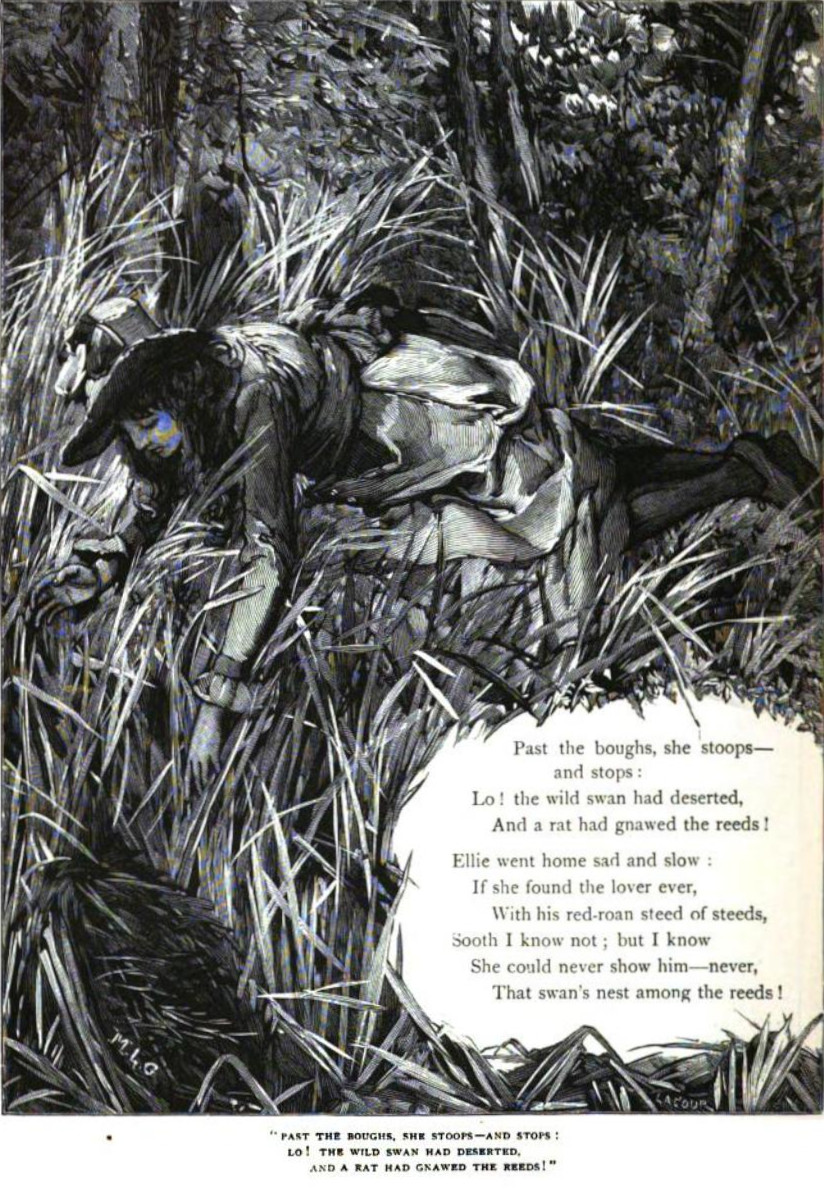
Elizabeth Barrett Browning (1806–1861), one of the most prominent poets of the Victorian era, became widely popular in England and the United States during her lifetime, both for her poetry and her stands against slavery in the United States, injustice toward Italian citizens by foreign rulers, and child labour. From age 15 until her death, she had to battle with a lifelong illness.
Her first known poem, “On the Cruelty of Forcement to Man,” was written at the age of six or eight. She published her first collection of poems, An Essay on Mind, with Other Poems, in 1826. Her 1844 volume Poems made her one of the most popular writers in Britain at the time. A collection of her last poems was published by her husband, the poet Robert Browning, shortly after her death.
In the following poem, from Illustrated British Ballads, Old and New, a little girl imagines that she will get as lover a noble knight who will kneel low in front of her, and in return she will show him the swan’s nest among the reeds. But she discovers that the swan has deserted the pond and a rat has gnawed the reeds.
The Romance of the Swan’s Nest
by Elizabeth Barrett Browning
Little Ellie sits alone
‘Mid the beeches of a meadow,
By a stream-side on the grass;
And the trees are showering down
Doubles of their leaves in shadow
On her shining hair and face.
She has thrown her bonnet by,
And her feet she has been dipping
In the shallow water’s flow.
Now she holds them nakedly
In her hands, all sleek and dripping,
While she rocketh to and fro.
Little Ellie sits alone,
And the smile she softly uses
Fills the silence like a speech
While she thinks what shall be done,
And the sweetest pleasure chooses
For her future within reach.
Little Ellie in her smile
Chooses—“I will have a lover,
Riding on a steed of steeds:
He shall love me without guile,
And to him I will discover
The swan’s nest among the reeds.
“And the steed shall be red-roan,
And the lover shall be noble,
With an eye that takes the breath;
And the lute he plays upon
Shall strike ladies into trouble,
As his sword strikes men to death.
“And the steed it shall be shod
All in silver, housed in azure,
And the mane shall swim the wind;
And the hoofs along the sod
Shall flash onward and keep measure,
Till the shepherds look behind.
“But my lover will not prize
All the glory that he rides in,
When he gazes in my face:
He will say, ‘O Love, thine eyes
Build the shrine my soul abides in,
And I kneel here for thy grace!’
“Then, ay, then he shall kneel low,
With the red-roan steed anear him,
Which shall seem to understand,
Till I answer, ‘Rise and go!
For the world must love and fear him
Whom I gift with heart and hand.’
“Then he will arise so pale,
I shall feel my own lips tremble
With a ‘Yes‘ I must not say.
Natheless maiden-brave, ‘Farewell!’
I will utter, and dissemble—
‘Light to-morrow with to-day!’
“Then he’ll ride among the hills,
To the wide world past the river,
There to put away all wrong;
To make straight distorted wills,
And to empty the broad quiver
Which the wicked bear along.
“Three times shall a young foot-page
Swim the stream and climb the mountain,
And kneel down beside my feet:
‘Lo! my master sends this gage,
Lady, for thy pity’s counting:
What wilt thou exchange for it?’
“And the first time I will send
A white rosebud for a guerdon,
And the second time a glove;
But the third time I may bend
From my pride, and answer, ‘Pardon,
If he comes to take my love.’
“Then the young foot-page will run,
Then my lover will ride faster,
Till he kneeleth at my knee:
‘I am a duke’s eldest son,
Thousand serfs do call me master,
But, O Love, I love but thee!‘
“He will kiss me on the mouth
Then, and lead me as a lover
Through the crowds that praise his deeds;
And, when soul-tied by one troth,
Unto him I will discover
That swan’s nest among the reeds.”
Little Ellie, with her smile
Not yet ended, rose up gaily,
Tied the bonnet, donned the shoe,
And went homeward, round a mile,
Just to see, as she did daily,
What more eggs were with the two.
Pushing through the elm-tree copse,
Winding up the stream, light-hearted,
Where the osier pathway leads;
Past the boughs she stoops—and stops:
Lo! the wild swan had deserted,
And a rat had gnawed the reeds!
Ellie went home sad and slow:
If she found the lover ever,
With his red-roan steed of steeds,
Sooth I know not; but I know
She could never show him—never,
That swan’s nest among the reeds!

Source of the poem: Illustrated British Ballads, Old and New, selected and edited by George Barnett Smith, Volume 2. London, Paris & New York: Cassell, Petter, Galpin & Company (1881). Digitised on Google Books. The poem, with 2 illustrations by Mary L. Gow, starts on page 216.
Other versions of the poem, with a slightly different punctuation, have been given by University of Victoria’s Digital Victorian Periodical Poetry and by PoetryNook.
This poem has been reprinted in the collection L’Univers sensuel, sexuel et sentimental de la Fillette impubère, au travers de l’Histoire, de l’Ethnographie et de la Littérature, Tome I : Interactions entre enfants by François Lemonnier. Thanks to him for drawing my attention to it.

